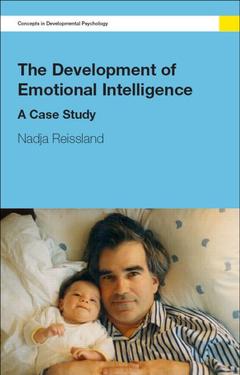The Development of Emotional Intelligence A Case Study Concepts in Developmental Psychology Series
Auteur : Reissland Nadja

How do children learn about the expression and meaning of emotions ? both happy and sad? This book answers questions regarding the foundation of emotional intelligence, and examines how children become emotionally literate as they are socialised into their family environment from birth to 2 years of age. These early stages are vitally important in teaching children to understand themselves and others, as well as how to relate to people, and how to adapt to and cope with their immediate surroundings.
In order to examine the development of emotional intelligence, the author presents an overview of the literature on the subject and in the second part of the book presents a case study in which the concepts introduced in the first part of the book are revisited. Based on daily tape-recorded ?conversations? between a baby and her father, the data demonstrate how, over a two-year period, the child learns to express and understand emotions within social interactions. This capacity to reason with emotions is examined through four areas: perceiving emotion, integrating emotion, understanding emotion and managing emotion.
The Development of Emotional Intelligence adds a new perspective to the theoretical debate on emotions and how they develop. It will be of great interest to psychologists and any professionals dealing with families. It will also be helpful reading for parents.
Part 1. Overview of the Literature on Emotional Intelligence (EI). 1. Introduction. 2. Emotional Intelligence: Models and Controversies. 3. The Language of Emotional Intelligence. 4. Regulation of Emotional Expression. 5. Emotional Intelligence: The Ability to Interact Emotionally through Empathy. 6. Emotional Intelligence, Health and Negative Emotions. Part 2. Case Study. Introduction to the Case Study. 7. The Language of Emotions from the First Months of Life. 8. Acoustic Aspects of Emotion Talk. 9. On the Changing Table: The Use of Rhetoric with an Infant. 10. Teasing and Emotional Development. 11. From ‘Social Smile’ to Laughter: How Positive Emotions Develop. 12. Toto’s Experience of Her Father’s Death. 13. Conclusion. 14. Emotional Intelligence for Parents.
Nadja Reissland is a Senior Lecturer in the Department of Psychology at Durham University. Her research concerns emotional development from the prenatal period to early childhood in relation to maternal stress and depression. Her latest research examines fetal facial expressions in utero.
Date de parution : 01-2012
13.8x21.6 cm
Date de parution : 02-2012
13.8x21.6 cm
Thème de The Development of Emotional Intelligence :
Mots-clés :
mayer-salovey-caruso; test; changing; table; ability; trait; father; comments; higher; negative; Emotion Context Insensitivity; Multifactor Emotional Intelligence Scale; MSCEIT; Trait EI; Maternal Behaviour Influences; Non-dysphoric Individuals; Emotional Intelligence; St Tropez; Trait Emotional Intelligence; Ability EI; High EI; Emotional Quotient Inventory; Fundamental Frequency; Non-depressed Mothers; EI Measure; Asperger Syndrome; Teasing Behaviour; False Belief Tasks; Component Process Model; Law Emotional Intelligence Scale; Antisocial Behavior; Emotional Intelligence Scale; Dyadic Affect Regulation; Children's Emotional Competence; Social Abilities



